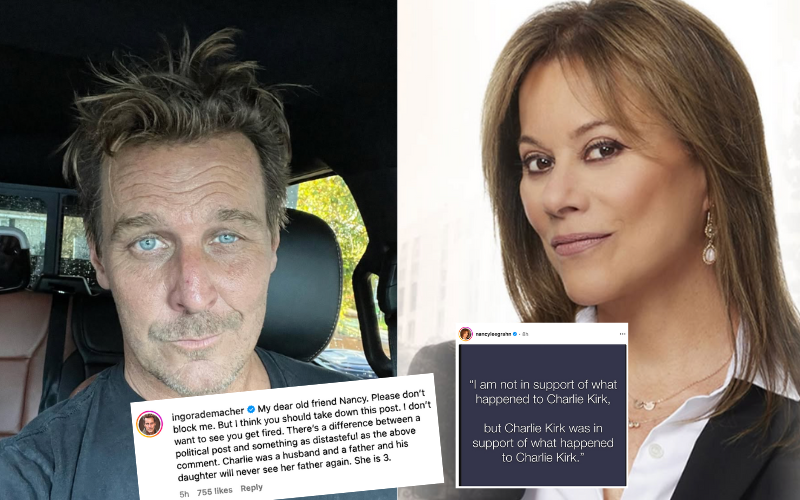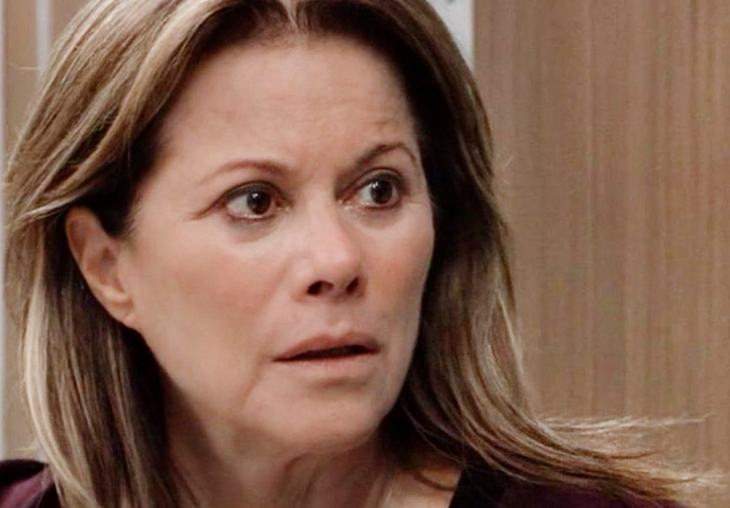Nancy Lee Grahn Sparks Outrage by Suggesting Charlie Kirk Shared Blame in His Own Assassination Through Cryptic Instagram Post

In the wake of conservative commentator Charlie Kirk’s shocking assassination, public discourse has been dominated by sorrow, anger, and politicized debate. Then came a post that turned up the tension another notch: General Hospital actress Nancy Lee Grahn published a cryptic Instagram message that many interpret as blaming Kirk for his own death. The fallout has been rapid, merciless, and emotionally charged.
Charlie Kirk, founder of Turning Point USA and a prominent conservative voice, was fatally shot on September 10, 2025, during a speaking event at Utah Valley University. Authorities have called it a “political assassination,” and investigations remain ongoing. Social media was flooded with condolences—but also with misinformation, anger, political commentary, and protests that this kind of political violence must stop.
Amid the outpouring of grief, Nancy Lee Grahn, known to General Hospital fans as Alexis Davis, posted on Instagram something that stunned many: “I am not in support of what happened to Charlie Kirk, but Charlie Kirk was in support of what happened to Charlie Kirk.” The line has been widely shared and dissected, with interpretations ranging from a political jab to something more unsettling—that Grahn was suggesting Kirk’s own stances, words, or actions made violence against him inevitable or partially his fault.

The reaction has been swift: fans of General Hospital, followers of Charlie Kirk, and many in between have condemned the post. Some say it crosses a very serious moral line—when someone expresses views or engages in speech you disagree with, it is still wrong to insinuate that they deserved harm. Others are calling for Nancy Lee Grahn to issue a public apology, retract the statement, or clarify her meaning. Most also say it’s disrespectful—not just to Kirk, but to his grieving family. One notable comment came from actor Ingo Rademacher, a former castmate, urging her to take the post down, warning that it could damage her reputation and her relationship with fans.
On the flip side are those who caution against conflating nuance with blame. Some support her right to free speech, pointing out that the post, while controversial, might be interpreted as commentary on how public discourse and rhetoric contribute to a toxic environment—rather than a literal accusation that Kirk’s own beliefs “caused” his death. But even that view hasn’t stopped the backlash from raging online. Grahn’s post stands as a lightning rod in the divide between free expression and sensitivity toward victims, especially in moments of national tragedy.
There’s also concern over the timing and tone. Many feel it was too soon, given that the investigation is still in early stages. Accusations of spreading dangerous narratives, offering conspiracy-adjacent blame, and minimizing responsibility for political violence are surfacing. Because Kirk was killed in public, during a highly politicized event, any suggestion that “he supported what happened to him” is being read by many as victim-blaming—an idea nearly universally rejected when someone is murdered.

Adding to the fire: there appears to be no public correction or apology from Nancy Lee Grahn—at least not yet. Her post remains up, allowing the debate to spill into comment threads, interviews, and fan forums. Supporters of Kirk call it deeply hurtful. Others demand consequences: should she be removed from the show? Should her employers respond? The pressure is mounting.
Beyond the immediate controversy, this incident underscores broader dangers when public figures make statements about another person’s death—especially one as recent, public, and politically charged as Kirk’s. The tension between free speech, respect for the deceased, and the demands of political accountability has never been sharper. When you’re a recognized personality—especially in entertainment—the reach of what you say is amplified, and inference becomes interpretation.
What comes next is uncertain. Will Nancy Lee Grahn clarify or walk back her words? Will she face professional consequences, either from the network or public pressure? Will her reputation among General Hospital viewers be permanently altered by this moment? And perhaps most importantly: what does all this tell us about where society stands on responsibility for political violence, blame, and how we process grief?
One thing is clear: this is more than another celebrity misstep. It’s a social moment. A probe into how we treat the line between accountability for ideas and fairness to victims. When tragedy strikes, many demand justice—but few expect the bereaved, or those connected, to suggest the victim played a role. For many, Nancy Lee Grahn’s post crossed that line.
As the investigation into Charlie Kirk’s death progresses, the eyes of the public remain fixed not only on who pulled the trigger—but also on who shapes the narrative afterward.